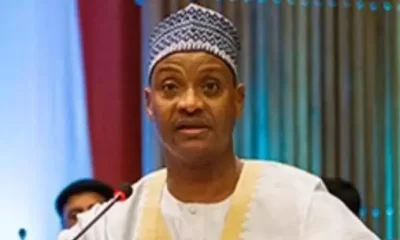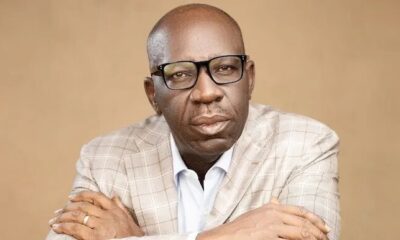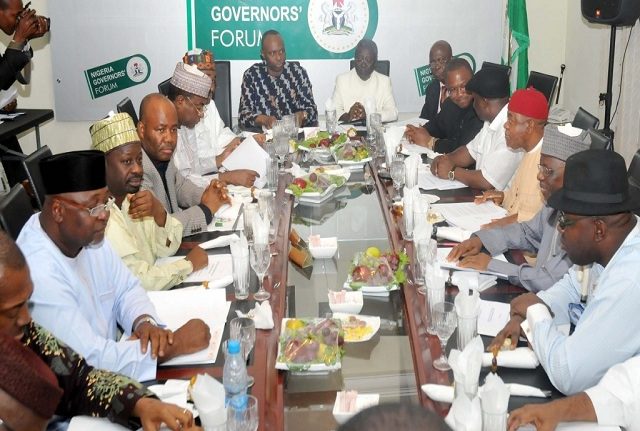Educational Issues
The NANS Leadership Election and the Troubled Historical Narrative of Ugliness, Corruption, and Lingering Violence in Governance – Continuing the Nation’s Future Leadership Challenges -By John Egbeazien Oshodi
The lessons drawn from the NANS election should serve as a crucible for forging leaders who prioritize ethical conduct, fairness, and the greater good. It is an opportunity for Nigeria to redefine its narrative, weaving a new tapestry of leadership that reflects the aspirations of a nation yearning for unity, progress, and ethical governance.

Unearthing the Genesis of Nigeria’s Leadership Woes: A Closer Look at the Origin in Student Elections, Where Corruption and Violence Take Root, Echoing Throughout the Nation’s Troubled Political Landscape
In a recent and alarming twist of events, the National Association of Nigerian Students (NANS) gathered for its leadership election, only to be engulfed in a disconcerting display of chaos and violence. Media reports from Nigeria vividly portray an electoral process originally designed to mold the trajectories of future leaders in tertiary institutions. However, instead of serving this noble purpose, it devolved into a battleground. It’s noteworthy that this unsettling incident unfolded in the nation’s capital, Abuja, the seat of the federal government and the residence of the president. The incredibility of such a scenario prompts reflection, leaving one to ponder how student groups in many other countries would perceive or believe such a narrative.
The catalyst for this violence is attributed to a group allegedly supporting a candidate favored by Seyi Tinubu, the son of President Bola Tinubu. Among the reported leaders of this faction is Sunday Asefon, recently appointed as the Senior Special Assistant to President Tinubu on Students Engagements. However, beyond the immediate ramifications of this violent episode lies a deeper, disquieting narrative, resonating with historical echoes of turbulence, corruption, and lingering violence within governance.
The aggressive turn of events prompts a probing examination into the values instilled in Nigeria’s future leaders during their student years. The implications extend far beyond the immediate electoral strife, reaching into the psychological realms that often serve as a precursor to individuals’ approaches in various professional fields, including law enforcement, civil service, and government.
Adding layers of complexity to this already fraught situation is the reported involvement of external figures supporting specific candidates. Such external influences have the potential to exacerbate divisions within the student body, sowing seeds for future conflicts that could permeate and disrupt the nation’s governance and stability.
Student leadership, traditionally seen as a crucible for shaping the character of future leaders, currently faces a moment of profound reckoning. The challenges laid bare in these elections not only signify immediate issues but also point to potential shortcomings in the cultivation of crucial leadership skills and ethical values among the next generation of leaders. The psychological ramifications of these experiences have far-reaching implications, extending into various sectors of society.
From these mindsets cultivated during student years, a new cadre of civil service and corporate officials emerges. This encompasses a broad spectrum, ranging from local positions to pivotal roles at the state and national levels. The impact is pervasive, influencing key sectors such as finance with figures like accountants general, governance with ministers, security with heads of security agencies, and even extending to religious, police, military, diplomatic, medical, civil, corporate, educational, judiciary, and legislative leadership roles. The far-reaching consequences of the challenges faced in student elections ripple through society, shaping the ethos of those who will one day hold the reins of power and influence.
The “wow!” moment lies in the realization that the values instilled in these emerging leaders during their formative years have the potential to reverberate across the entire landscape of governance and civic responsibility. The mindset cultivated within student leaders becomes a blueprint, influencing not only their personal trajectories but also the trajectory of the nation. As they transition from student politics to more significant roles, these individuals carry with them the imprint of their early experiences, impacting the ethos of institutions and systems they enter.
Therefore, the challenges within student leadership aren’t isolated incidents but are indicative of the broader state of leadership in the making. The implications are staggering, shaping the future of Nigeria’s civil service, corporate landscape, security apparatus, and governance structures. The “wow!” is not just an exclamation but a recognition of the profound influence that student leadership can exert on the very fabric of a nation. “Hey” “Na Wa o”
The turbulence within student politics not only mirrors but potentially amplifies broader challenges facing Nigeria – political instability, religious and ethnic tensions, violence, and financial improprieties.
The alleged interference and financial entanglement from political figures, exemplified by external political minds as reported by the media, unleash profound concerns regarding the autonomy and integrity of student leadership structures. The reported eruption of violence during the election casts dark psychosocial shadows on students, fostering not just stress and anxiety but an overwhelming sense of insecurity within the student body.
Leadership, irrespective of the level, serves as a potent model for ethical or unethical conduct, and student leaders are no exception. The witnessed manipulative tactics and corruption during these elections have the potential to etch enduring impressions on students, threatening to perpetuate a disheartening cycle of unethical practices.
Student elections, initially conceived as a pivotal avenue for political socialization, now teeter on the edge of transforming into a breeding ground for disillusionment with democratic ideals. Any imperfections in these processes hold the power to mold students’ perceptions of the political system, eroding trust and faith in democratic principles.
The concerns articulated about the mindset cultivated within student leaders extend far beyond the immediate future. The intricate interweaving of political, ethical, and leadership challenges in these elections poses a formidable threat to the nation as a whole. The engagement of antisocial and corrupt elements in student elections brings into sharp focus the leadership models presented, with far-reaching implications for the values and ethics that may infiltrate higher political offices.
The negative incidents, particularly those involving violence and electoral malpractices, contribute to a tarnished international image, reinforcing stereotypes and misconceptions about governance and leadership in Nigeria. Irregularities and external influences in student elections corrode trust in the democratic process, extending disillusionment to broader institutions and fostering apathy among the public.
The deployment of gunshots during the election indicates a calculated attempt to disrupt the democratic process, laying bare a strategic use of violence to influence outcomes. This unsettling tactic, often observed in more extensive political elections, now finds its origins in student leadership, demanding urgent scrutiny of ethical conduct and fairness within student politics. What a country. The resort to violence lays bare deep-seated tensions among student groups, underscoring the imperative for a comprehensive understanding of root causes to implement preventive measures and foster a more constructive political environment. The presence of firearms raises substantial security concerns, necessitating an immediate reevaluation of security measures to safeguard participants and uphold the integrity of the democratic process.
If this is happening at the student level, then we are unwittingly sowing the seeds for a future generation of deeply corrupt, violent, and unethical state and national leaders. God save Nigeria.
The involvement of thuggish, corrupt, criminal, bad, evil, and violent elements in student elections triggers contemplation on the model of leadership being presented, raising urgent concerns about the values and ethical standards that may infiltrate higher political offices. The issues within student politics reflect and potentially contribute to broader challenges facing Nigeria, indicating systemic problems that extend to the national stage.
Addressing the observed issues in student elections demands a comprehensive approach, including reforms in educational systems, the promotion of ethical leadership, and a commitment to transparent and accountable governance. It necessitates a collective effort aimed at shaping the values and behaviors of current and future leaders for the betterment of Nigeria as a whole.
In conclusion, the NANS leadership election serves as a chilling revelation of disturbing realities, echoing a troubled historical narrative that has woven its threads into the fabric of Nigeria’s socio-political landscape. It stands as a poignant chapter in the larger narrative of the nation’s student politics, leaving an indelible mark that demands introspection and reform.
The echoes of a troubled history are not mere whispers but resonant calls for action. They reverberate through the clashes, violence, and reported external influences that marred the election process. These echoes transcend the immediate context, reaching into the roots of systemic issues that have plagued student politics and, by extension, the broader governance structures of Nigeria.
This pivotal moment should be viewed as more than an isolated incident; it is a mirror reflecting the deep-seated challenges ingrained within the historical trajectory of Nigeria’s leadership development. It prompts a collective acknowledgment of the need for a paradigm shift—an imperative to confront and rectify the systemic issues that have persisted for far too long.
The election’s unsettling events are a catalyst for change, urging Nigeria to reassess the foundations upon which its future leaders are nurtured. It is a call to cultivate a new generation of leaders who possess the resilience, ethical fortitude, and commitment needed to navigate the complexities of governance with integrity.
To rectify these deeply rooted issues, comprehensive reforms are essential. Educational institutions must undergo transformative changes to instill values of ethical leadership, civic responsibility, and democratic principles. Transparent and fair electoral processes are paramount to restoring faith in the democratic system, not only within the student community but on a national scale.
The lessons drawn from the NANS election should serve as a crucible for forging leaders who prioritize ethical conduct, fairness, and the greater good. It is an opportunity for Nigeria to redefine its narrative, weaving a new tapestry of leadership that reflects the aspirations of a nation yearning for unity, progress, and ethical governance.
Confronting and rectifying these systemic issues demands not only introspection but also concrete actions. It is an invitation for Nigeria to embark on a transformative journey—one that reshapes the contours of leadership, fostering an environment where principles of accountability, transparency, and national well-being are paramount.
In essence, the NANS leadership election encapsulates more than a fleeting moment; it unfolds as a compelling chapter that implores Nigeria to embark on a transformative journey. This election is a resounding call for the nation to wield the pen of change, rewriting its historical trajectory and charting a course towards a future where leaders, starting from student politics to the highest echelons of governance, embody ideals that steer Nigeria towards a destiny characterized by unity, progress, and ethical stewardship. In contemplating these profound implications, a deep sense of sorrow envelops my heart for my native land.
Professor John Egbeazien Oshodi, who was born in Uromi, Edo State, Nigeria, to a father who served in the Nigeria police for 37 years, is an American-based police and prison scientist and forensic, clinical, and legal psychologist. A government consultant on matters of forensic-clinical psychological services in the USA; and a former interim associate dean and assistant professor at Broward College, Florida. The Founder of the Dr. John Egbeazien Oshodi Foundation, Center for Psychological Health and Behavioral Change in African Settings. In 2011, he introduced state-of-the-art forensic psychology into Nigeria through N.U.C. and Nasarawa State University, where he served in the Department of Psychology as an Associate Professor. He has taught at various universities and colleges including Florida memorial University, Florida International University, Broward college, Lynn University, and a contributing faculty member at the Weldios university in Benin Republic, Nexus International University, Uganda, Nova Southeastern University and Walden University in USA. He is a Human Rights Psychologist with a focus on African related environments. john.oshodi@mail.waldenu.edu


















